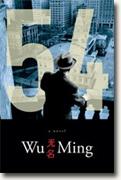54
Wu Ming
book reviews:
· general fiction
· chick lit/romance
· sci-fi/fantasy
· graphic novels
· nonfiction
· audio books
· author interviews
· children's books @
curledupkids.com
· DVD reviews @
curledupdvd.com
newsletter
win books
buy online
links
home
for authors
& publishers
for reviewers

 |
54 Wu Ming Harcourt Hardcover 560 pages July 2006 |
|
When a novel balances itself on the head of a pin, and when the complexities of that novel come to weigh as much as the pyramids, there is always the chance that the whole thing will come tumbling down to destroy the piece and end the suspension of belief. The longer the novel, the more intricate the complications, the greater the sense that now, just now, or at the very latest the next page, the plot will unravel and the machinations behind it all will be revealed. Broken cogs in a clock, the hand stuffed inside the ventriloquist's dummy.
54 The plot is split into two halves. The first involves Cary Grant's mission to Yugoslavia and the bizarre interactions that take place between himself and the other characters. Roughly half of this is devoted to Cary Grant's efforts in training his replacement and traveling to Yugoslavia, and half to Pierre. Scattered throughout are smaller chapters which don't seem to have much to do with anything, though they help tie events together during the first climax of the novel at the end of the first part and form the primary thrust of the second part. Grant is as suave and charismatic as one would hope; adding a nice touch to that is Pierre's fondness for the actor. The second half plays up the role of the McGuffin television set as it is shuffled from character to character, its importance a mystery until suddenly everything comes to an explosive conclusion. Pierre remains an integral part of the novel in the second half, though Grant falls to the sidelines. For all that the novel seems focused on Grant and Yugoslavia, there is a strong emphasis placed on the state of Italy post-World War II. The characters shown are tired, worn, waiting. After the war, the world changed in ways that have made them uncomfortable. America is encroaching upon their lifestyles, and the promises of the revolution never really came to fruition. The Aurora Bar's - Pierre's bar - struggle to purchase a television (which is, of course, the McGuffin) for the upcoming soccer World Cup is pathetic and sad, yet entertaining and hopeful. There is a sense that the old Italy is seconds away from leaving, with consumerism, commercialism, capitalism and all those others -isms of which America is so fond of exporting, right around the corner. The dire specter of heroin also raises its head, though this functions more as a monetary device than any real social criticism. Wu Ming means 'anonymous' in Chinese, a name the Wu Ming collective have taken because they wish to dissociate their true names from the celebrity and fame that comes with authorship. Who they are is not important; what they are writing is, or so the saying goes. It is interesting to note that none of the anonymous Wu Ming members are actually unknown - a cursory Internet search will reveal who they are - which strikes me as a more honest way of attaining the anonymity required. The chapters of the novel are often written in such a different style that it becomes almost a game to pick which member of the collective is responsible for which piece of text, and I would suggest in the future that a group of five translators tackle the novel, one for each author. As it stands now, Shaun Whiteside performs an admirable job in the translation, through the proliferation of words like 'crap' and 'guys' in the narrative text come across as somewhat jarring. Setting aside the translation, there is also a sensation that the ending runs on for fifty pages longer than it should have, for no real reason other than to tie up loose ends that could have easily been left alone to the reader. 54 Originally published on Curled Up With A Good Book at www.curledup.com. © Damian Kelleher, 2007 |
|
|
|
 Click here to learn more about this month's sponsor! |
|
| fiction · sf/f · comic books · nonfiction · audio newsletter · free book contest · buy books online review index · links · · authors & publishers reviewers |
|
| site by ELBO Computing Resources, Inc. | |
